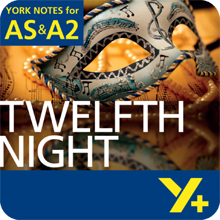Examiner's Notes
You assessed this answer as an A* grade.
Hover over the highlighted text to read the examiner’s comments. These are linked to the Assessment Objectives, which are listed in the side panel.
This is a very important theme in the play. It is not as important as love or madness but it is very important anyway so I will look into its effects and what happens. The line ‘Ourselves we do not owe …’ is said by Olivia when she gives her ring to Cesario. It shows that she is not in control of her feelings. She knows it’s bad to give a ring to a servant as she is a noblewoman but she’s saying she is going to see what happens – ‘Fate, show thy force’ (Act I Scene 5).
Other people who want to let things just happen are Viola and Sebastian. Viola doesn’t really have a plan, she just decides to become Orsino’s servant. He could have been anyone, but instead they just happen to fall in love. This shows how important luck is in the play. But we know everything will turn out ok as it’s a comedy. This is why Viola says, ‘O time thou must untangle this not I; It is too hard a knot for me t’untie’ (Act II Scene 2).
We need to think about Sebastian too. He is someone else who doesn’t really try to change Fate – he goes along with things even though everything is completely mad – this is why the country is called ‘Illyria’ – it sounds like somewhere that is mad and magical where you would let yourself go. Sebastian doesn’t really question the madness. He just accepts it: ‘If it be thus to dream, still let me sleep!’ (Act I Scene 4). People in Shakespeare’s day would have been very superstitious so they would think that maybe something in the moon or stars is guiding my movements, so there’s not anything I can do. Like Romeo says, there’s a danger. He says it is ‘hanging in the stars’.
